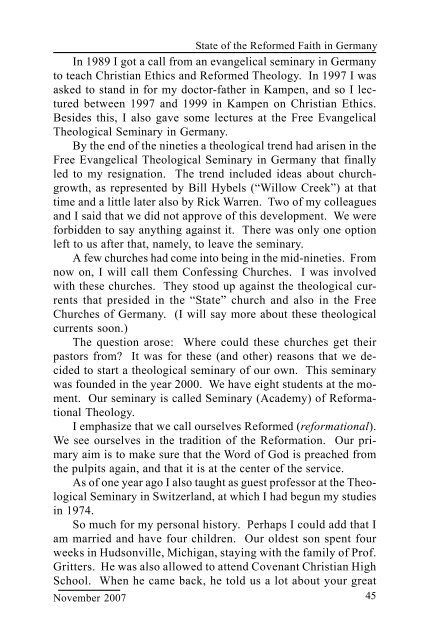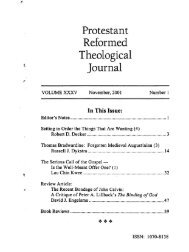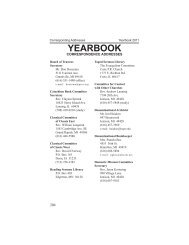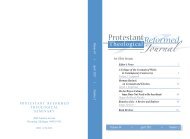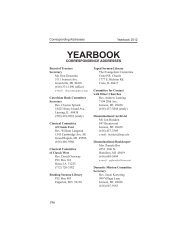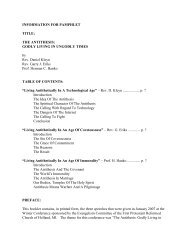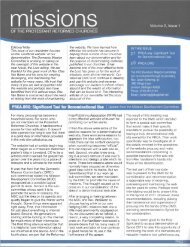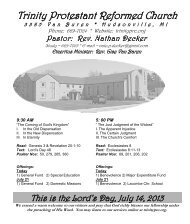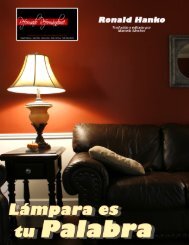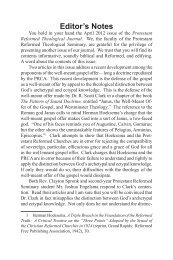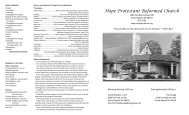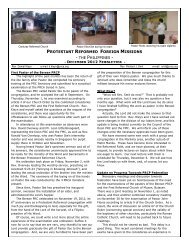November 2007 - Protestant Reformed Churches in America
November 2007 - Protestant Reformed Churches in America
November 2007 - Protestant Reformed Churches in America
You also want an ePaper? Increase the reach of your titles
YUMPU automatically turns print PDFs into web optimized ePapers that Google loves.
State of the <strong>Reformed</strong> Faith <strong>in</strong> Germany<br />
In 1989 I got a call from an evangelical sem<strong>in</strong>ary <strong>in</strong> Germany<br />
to teach Christian Ethics and <strong>Reformed</strong> Theology. In 1997 I was<br />
asked to stand <strong>in</strong> for my doctor-father <strong>in</strong> Kampen, and so I lectured<br />
between 1997 and 1999 <strong>in</strong> Kampen on Christian Ethics.<br />
Besides this, I also gave some lectures at the Free Evangelical<br />
Theological Sem<strong>in</strong>ary <strong>in</strong> Germany.<br />
By the end of the n<strong>in</strong>eties a theological trend had arisen <strong>in</strong> the<br />
Free Evangelical Theological Sem<strong>in</strong>ary <strong>in</strong> Germany that f<strong>in</strong>ally<br />
led to my resignation. The trend <strong>in</strong>cluded ideas about churchgrowth,<br />
as represented by Bill Hybels (“Willow Creek”) at that<br />
time and a little later also by Rick Warren. Two of my colleagues<br />
and I said that we did not approve of this development. We were<br />
forbidden to say anyth<strong>in</strong>g aga<strong>in</strong>st it. There was only one option<br />
left to us after that, namely, to leave the sem<strong>in</strong>ary.<br />
A few churches had come <strong>in</strong>to be<strong>in</strong>g <strong>in</strong> the mid-n<strong>in</strong>eties. From<br />
now on, I will call them Confess<strong>in</strong>g <strong>Churches</strong>. I was <strong>in</strong>volved<br />
with these churches. They stood up aga<strong>in</strong>st the theological currents<br />
that presided <strong>in</strong> the “State” church and also <strong>in</strong> the Free<br />
<strong>Churches</strong> of Germany. (I will say more about these theological<br />
currents soon.)<br />
The question arose: Where could these churches get their<br />
pastors from It was for these (and other) reasons that we decided<br />
to start a theological sem<strong>in</strong>ary of our own. This sem<strong>in</strong>ary<br />
was founded <strong>in</strong> the year 2000. We have eight students at the moment.<br />
Our sem<strong>in</strong>ary is called Sem<strong>in</strong>ary (Academy) of Reformational<br />
Theology.<br />
I emphasize that we call ourselves <strong>Reformed</strong> (reformational).<br />
We see ourselves <strong>in</strong> the tradition of the Reformation. Our primary<br />
aim is to make sure that the Word of God is preached from<br />
the pulpits aga<strong>in</strong>, and that it is at the center of the service.<br />
As of one year ago I also taught as guest professor at the Theological<br />
Sem<strong>in</strong>ary <strong>in</strong> Switzerland, at which I had begun my studies<br />
<strong>in</strong> 1974.<br />
So much for my personal history. Perhaps I could add that I<br />
am married and have four children. Our oldest son spent four<br />
weeks <strong>in</strong> Hudsonville, Michigan, stay<strong>in</strong>g with the family of Prof.<br />
Gritters. He was also allowed to attend Covenant Christian High<br />
School. When he came back, he told us a lot about your great<br />
<strong>November</strong> <strong>2007</strong> 45


